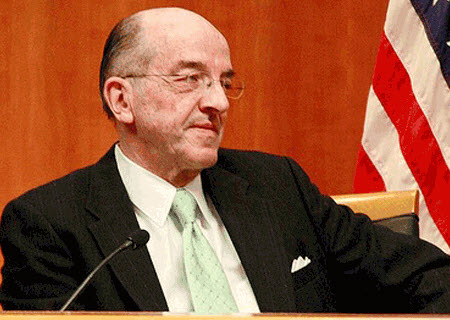Copps, 13 Years Later, 'Wowed' by Open Internet Vote
The smarter way to stay on top of the multichannel video marketplace. Sign up below.
You are now subscribed
Your newsletter sign-up was successful

Michael Copps, the former Federal Communications Commission commissioner, had a poignant moment at the end of last week's FCC meeting at which Title II regulation for Internet services was adopted.
As the crowd milled around, Copps worked his way to the front of the room and had a long chat with his former legal advisor, who also just happened to be commissioner Jessica Rosenworcel, who had voted "for" the plan. There was no audio of the informal conversation, although the C-SPAN camera captured plenty of smiles, head-nodding and a sense of accomplishment as the two celebrated a shared achievement.
For Copps, who from 2001 to 2011 served as an FCC commissioner (and briefly as interim chairman in 2009), it was a "wonderful feeling ... going back into the meeting room where I cast the only dissenting vote" when in 2002 then-FCC chairman Michael Powell pushed through the light-touch Internet regulatory policy, Copps told Multichannel News this week.
"I was thinking, 'Wow, this is really a big deal,'" Copps said. "To be there and be part of the enthusiasm and understanding that citizen power had a lot to do [with it] was a moving experience."
Copps, a passionate advocate for Title II regulation, said he was "thrilled to be there" when "we put ourselves more firmly on the road to Open Internet." He characterized the FCC's 3-2 decision as "a critical step" because it established "the best legal foundation" for the court and legislative challenges ahead.
Implementation and enforcement are now the FCC's major hurdles, he said.
"I'll be watching to make sure that we have a good implementation team," Copps said. "We've seen in the past all kinds of conditions put on them. I don't think that will happen here."
The smarter way to stay on top of the multichannel video marketplace. Sign up below.
Copps, who now serves as special advisor to Common Cause's Media and Democracy Reform Initiative and is also associated with the Benton Foundation, focused on the importance of the four million public comments that flowed into the FCC as well as President Obama's endorsement of Title II regulation.
"The fact that people would be attracted to [supporting] something as wishy-washy sounding as 'net neutrality'" was "incredible," Copps said. He called the presidential support "very influential" and not unprecedented, citing President George W. Bush's push on network-ownership issues.
Recognizing the inevitable Capitol Hill reviews of the FCC's decision, Copps said he "feels sorry for the commissioners having to spend so much time up there." He contended that the more Republican legislators "push this, they'll find it is not playing too well back home." He referred to polls -- but did not indicate a source -- that suggest "80% of the public doesn't want fast lanes."
'This is not a party issue," Copps said, referring again to the Republicans who opposed Title II regulation. "They may be in for a surprise."
He also complimented the FCC's "community broadband" decision as "a wonderful thing." Just prior to the net-neutrality vote, the Commission (also in a 3-2 partisan vote) ruled that Tennessee and North Carolina cannot stop local municipalities from expanding their own broadband networks.
"Put those all together, and we can make some forward progress," Copps said. Both votes resultedin "good rules that will encourage innovation."
"There's going to be a lot of money made," he added.
Maintaining his long-held populist views, Copps posted a blog this week simply entitled "Victory," in which he predicted that in the upcoming legal challenges, Internet Service Providers (naming names such as Verizon, Comcast and AT&T) will trot out "old skeletons dressed in new clothes." He said he expects "more astroturf strategy" and he doubts the ISPs "will be able to come up with anything new."
In particular, he said he hopes that civil rights and labor organizations won't be seduced again to support the ISPs' views after "they have [been] favored with corporate contributions ... to spread the ISPs’ message."
"Now is the time for them to rally 'round the Open Internet flag and fight for what has been achieved, rather than become the unwitting tool of those who seek to close the doors of Internet opportunity," Copps wrote in his blog. He deemed the FCC's decision "a civil rights issue -- perhaps the preeminent one of the 21st century."
Copps said he views the FCC's ruling as a "significant reform" that came "from pressure from the grassroots. That's really important."
"That was a big deal," he added. "It bodes well for the future of the Open Internet."
Contributor Gary Arlen is known for his insights into the convergence of media, telecom, content and technology. Gary was founder/editor/publisher of Interactivity Report, TeleServices Report and other influential newsletters; he was the longtime “curmudgeon” columnist for Multichannel News as well as a regular contributor to AdMap, Washington Technology and Telecommunications Reports. He writes regularly about trends and media/marketing for the Consumer Technology Association's i3 magazine plus several blogs. Gary has taught media-focused courses on the adjunct faculties at George Mason University and American University and has guest-lectured at MIT, Harvard, UCLA, University of Southern California and Northwestern University and at countless media, marketing and technology industry events. As President of Arlen Communications LLC, he has provided analyses about the development of applications and services for entertainment, marketing and e-commerce.

